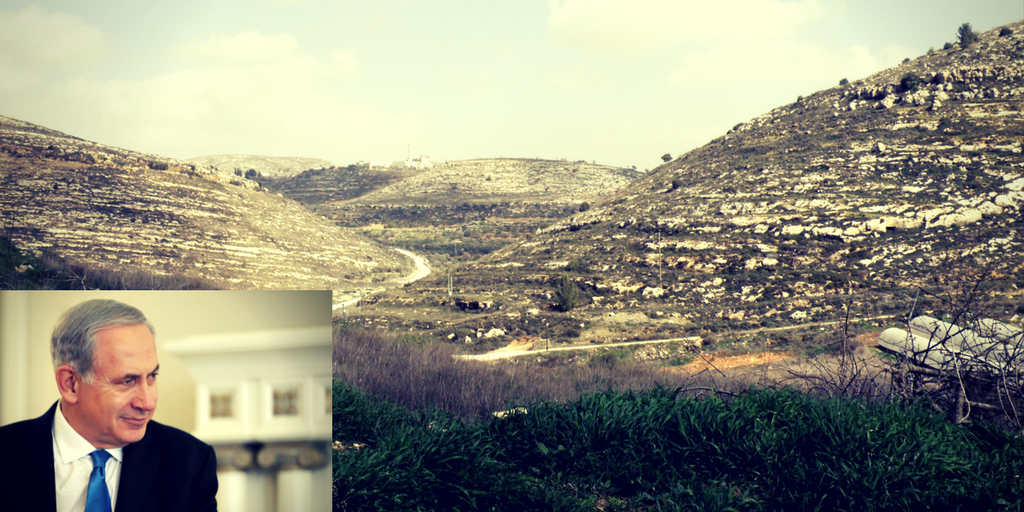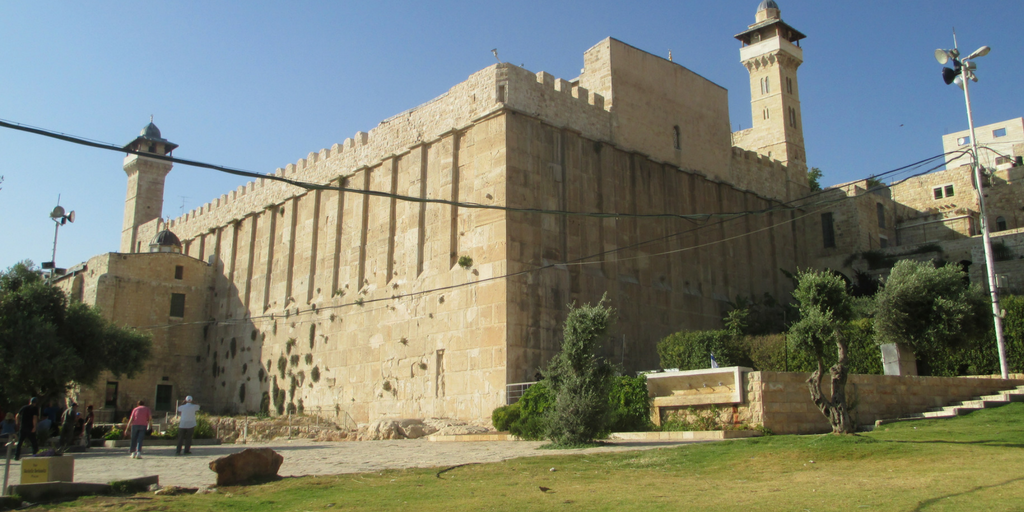y rigorous process of elimination, we are left with the Humanitarian Paradigm, as the only possible policy prescription able to adequately address the imperatives needed to preserve Israel as the nation state of Jews.
O, who can hold a fire in his hand; By thinking on the frosty Caucasus?
Or cloy the hungry edge of appetite; By bare imagination of a feast?
Or wallow naked in December snow; By thinking on fantastic summer’s heat?
– William Shakespeare, in Richard II, Act1 Scene 3, on the futility of self-deception
There is nothing more deceptive than an obvious fact.– Sherlock Holmes, “The Boscombe Valley Mystery”
Last week I began a two-part analysis of the policy paradigms that have emerged in the public discourse for dealing with the more-than-century old dispute between Jews and Arabs over control of the Holy Land as the conflict approaches its third post-Oslo decade.
In it, I identified four such archetypical paradigms for its resolution—and one for its “management” (a.k.a. its perpetuation). Moreover, I undertook to demonstrate that only one of these alternatives, the Humanitarian Paradigm, advocating funded emigration of the Arab residents of Judea-Samaria (and eventually Gaza)—is consistent with the long-term survival of Israel as the nation-state of the Jews. Accordingly, for those dedicated to the preservation of the Zionist ideal, it is nothing less than “Hobson’s choice”.
To recap briefly
Readers will recall that I confined the analysis last week to those policy proposals that eschew full or partial Israeli annexation of territory, deferring analysis of those that endorse such annexation for this week’s discussion.
To recap briefly: In the aforementioned prior analysis I dealt with the (a) idea of “managing the conflict” and (b) the two-state formula.
As for the former, it was shown to reflect disregard for the fact that, without appropriate decisive proactive initiatives, Israel is facing a growing threat and decreasing freedom to deal with it. Accordingly, “managing the conflict” is little more than a pretext for backing away from confrontations in which Israel can prevail, while backing into a confrontation in which Israel might not prevail—or do so only at ruinous cost.
As for the latter, it has shown to be a fatally flawed formula, devoid of any sound theoretical foundation or empirical evidence on which to base its naïve prognoses for resolving the conflict by means of Palestinian statehood. Indeed, given the past precedents, there is little reason to believe—and two-state proponents have never provided one—that any future Palestinian state will not rapidly become a mega-Gaza on the fringes of Greater Tel Aviv, precipitating all the harrowing realities, wrought on the hapless residents of the South on those of the coastal megalopolis.
So having dealt with the policy paradigms that eschew annexation– whether full or partial–it is now time to assess those that endorse it.
One-state: Lebanonization of Israeli society
Some pundits on the Israeli “Right,” keenly aware of the infeasibility of the two-state paradigm, have in large measure adopted—albeit for very different reasons—a prescription very similar to that touted by their radical Left-wing adversaries—that of a single state stretching from the Jordan River to the Mediterranean Sea.
According to this proposal, Israel should extend its sovereignty over the entire area of Judea-Samaria and offer immediate permanent residency to all its Palestinian-Arab residents, as well as the right to apply for citizenship at some undefined date, via some undefined process to ascertain loyalty—or at least the absence of disloyalty—to Israel as the Jewish nation state.
The rationale, allegedly underpinning this ill-conceived proposal, is the new, optimistic demographic assessments suggesting that even if Israel were to enfranchise the Muslim population of Judea-Samaria, it would still retain a more than 60% Jewish majority.
Even conceding that this may be true, such a measure is likely to herald disaster for the Zionist enterprise and the future of Israel as the nation-state of the Jews. For the initial electoral arithmetic is hardly the defining factor in assessing the prudence of this approach, but rather the devastating effect it will have on the socio-economic fabric of the country and the impact this will have on preserving Israel as a desired/desirable place of residence for Jews inside and outside the country.
It would take considerable—and unsubstantiated—faith to entertain the belief that Israel could sustain itself as a Jewish nation-state with a massive Muslim minority of almost 40% – as the societal havoc that far smaller proportions have wrought in Europe indicate.
Indeed this is a clear recipe for the Lebanonization of Israeli society with all the inter-ethnic strife that tore Israel’s unfortunate northern neighbor apart.
Lebanonization of Israel (cont.)
Any forlorn hope that life under Israeli sovereignty will somehow “domesticate” the Palestinian-Arabs into reconciling themselves to life in the Jewish nation-state should have been well and truly dashed by the behavior of Israel’s Arab citizens.
After all, despite living (and prospering) for seven decades under Israeli sovereignty—and more than a half-century after military rule over the Arab population was abolished—they not only voted, almost en-bloc, for the vehemently anti-Zionist “Joint List” in the 2015 elections, but displayed great empathy in a mass funeral for the terrorists, from the Israeli town of Um-al Fahm, who murdered two Israeli police officers on the Temple Mount.
Once the Arab population of Judea-Samaria becomes incorporated into Israel’s permanent population, at least two crucial elements of national life are almost certain to be dramatically—and in Zionist-compliant terms, negatively –impacted. The one is the distribution of national resources; the other is population flows into, and out of, the country.
With regard to the former, clearly once the Arab residents of Judea and Samaria—whether enfranchised or not—become incorporated into the country’s permanent population, Israel will not be able to afford the kind of socio-economic disparities that prevail between the pre- and post-annexation segments of the population.
Accordingly, huge budget resources will have to be diverted to reduce these disparities – siphoning off funds currently spent on the Jewish population (and Israeli Arabs) in terms of welfare, medical care, infrastructure, education and so on.
Indeed, if enfranchisement (eventual or immediate) is envisaged, the electoral potential of the Arab sector is liable to be elevated from its current 13-15 seats in parliament to 25-30. This will not only hugely bolster its ability to demand enhanced budgetary allotments, but also make it virtually impossible to form a governing coalition without their endorsement.
Moreover, collaboration on various ad hoc parliamentary initiatives with radical Jewish left-wing factions is likely to nullify any formal calculations of an ostensible “Jewish majority”, and lead to legislative enterprises that ultra-Zionist proponents of annexation would strongly oppose – in an ironic manifestation of unintended consequences.
Partial Annexation: The Balkanization of Israel
Thus, while full annexation of Judea-Samaria will almost inevitably result in the Lebanonization of Israel—i.e. create a single society, so fractured by interethnic strife that it would be untenable as the nation- state of the Jewish people; proposals for the partial annexation of Judea-Samaria will result in the Balkanization of Israel – (i.e. dividing the territory up into disconnected autonomous enclaves, which will be recalcitrant, rivalrous and rejectionist, creating an ungovernable reality for Israel.)
Proposals for partial annexation appear to be fueled by (a) concern that total annexation would be too drastic a step for the international community to “swallow”, and (b) a sense that some semblance of self-rule must be facilitated for the Arabs resident in Judea and Samaria. As will be shown, partial annexation will address neither of these issues effectively. Indeed quite the opposite is true.
Proposals for partial annexation are commonly of two types: Those that prescribe including selected areas of Judea-Samaria under Israeli sovereignty (such as Area C as advanced by Education Minister Naftali Bennett) ; and those that prescribe excluding certain selected areas from Israeli sovereignty such as the large urban centers in Judea-Samaria (such as advanced by Dr. Mordechai Kedar in his “Emirates” plan)
Sadly, neither of these paradigms will solve any of the diplomatic or security problems Israel faces today, and will in fact exacerbate many.
The Balkanization of Israel (cont)
It is hardly necessary to go into the intricate details of the individual proposals for partial annexation to grasp how impractical they really are.
For whatever the configuration of the un-annexed areas left to Arab administration –whether the disconnected enclaves of Areas A and B, or the micro-mini “city states”—they will leave the sovereign territory of Israel with dauntingly long and contorted frontiers, making it almost impossible to delineate and secure. Clearly if one cannot effectively demarcate and secure one’s sovereign territory, there is little meaning to one’s sovereign authority over that territory.

Although Haaretz is not my preferred source of reference, I find it difficult to disagree with the following assessment of Bennett’s plan for annexing Area C:
“… Bennett’s plan is groundless from the security, diplomatic, legal and, especially, physical angles. It’s easy to discern that, contrary to what was presented in a video produced by Bennett’s…party recently, Areas A and B in the West Bank are not contiguous blocs, spreading over 40 percent of the West Bank. Instead, they consist of no less than 169 Palestinian blocs and communities, cut off from one another by innumerable Israeli corridors and unused IDF firing zones that are together defined as Area C”.
It correctly pointed out: “… in fact, Bennett is proposing to increase the length of the Israeli border from 313 kilometers to 1,800 kilometers (194 to 1,118 miles). If [one] believe[s] Bennett, he will doubtless back the dismantling of the security barrier that Israel has built to the tune of 15 billion shekels ($3.9 billion), but [one] will have to accept that annexing Area C means Israel will have to build a barrier along the new border at the cost of 27 billion shekels and allocate another 4 billion shekels per year for maintenance purposes.”
Partial Annexation: Full political price
Similar criticism can be leveled at Kedar’s proposal for setting up an array of up to eight micro-mini “emirates” or city states. It is not difficult to envisage the problems of future expansion beyond the highly constricted confines of disconnected enclaves, and of the need to severely curtail the authority of the local administration to deal with cross border issues such as pollution (particularly the carcinogenic emissions of the wide spread charcoal industry), sewage, pollution from industrial effluents, agricultural run-off, transmissible diseases and so on.
Of course, any hopes that partial annexation, which entails extending Israeli sovereignty over about 65-75% of the territory, leaving the Palestinian-Arabs with an emasculated 25-30%, in a quilted patchwork of disconnected enclaves and corridors, will in any way diminish international censure, are utterly unfounded. The political “pain” involved in such schemes would be no less than annexing 100% of the territory—without having to deal with the attendant chronic problems associated with partial annexation (as detailed above).
Fanciful suggestions that Nablus and Hebron might flourish into entities like Monaco and Luxembourg are as risible as those which, in the heady days of Oslo, predicted that Gaza would become the Hong Kong of the Mid East—and would be rightfully rejected as such.
Humanitarian Paradigm: Hobson’s choice
Even from the far-from-exhaustive analysis conducted over the last two weeks, it should be clear that an indisputable picture emerges as to the Zionist-compliant feasibility of the various policy paradigms proposed for dealing with the Israeli-Palestinian conflict.
Thus:
– The attempt to manage the conflict is little more than a formula for backing away from confrontations in which Israel can prevail, while backing into a confrontation in which Israel might not prevail—or may do so only at ruinous cost.
– The two-state paradigm will almost inevitably result in the establishment of a yet another homophobic, misogynistic, Muslim-majority tyranny, which will rapidly become a mega-Gaza on the fringes of Greater Tel Aviv, menacing the socio-economic routine in the commercial hub of the country.
-Full annexation of Judea-Samaria together with the Arab population will result in the Lebanonization of Israeli society and thrust the country into ruinous inter-ethnic strife that will imperil it status as the nation-state of the Jewish people.
– Partial annexation of Judea-Samaria will result in the Balkanization of Israel, dividing the territory up into disconnected, rivalrous, recalcitrant and unsustainable autonomous enclaves, which will create an ungovernable reality for Israel.
Thus, by a rigorous process of deductive elimination we are left with the Humanitarian Paradigm, advocating funded emigration for non-belligerent Palestinian-Arabs to third party countries, as the only possible paradigm that can adequately address both the geographic and demographic imperatives needed to preserve Israel as the nation state of Jews.
As such, for Zionists, it is Hobson’s choice. Anything else is self-deception.







